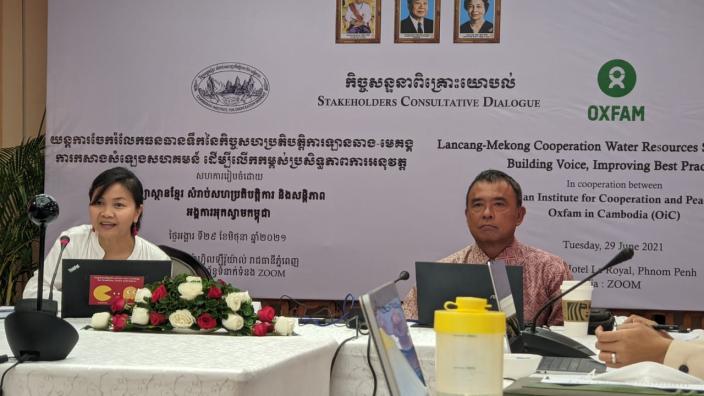Ms. Solinn Lim, Oxfam Country Director and Mr. Ambassador Pou Sothirak, Executive Director of Cambodian Institute for Cooperation and Peace (CICP).Photo: Kaneka Keo/Oxfam
STAKEHOLDERS CONSULTATIVE DIALOGUE
On Lancang-Mekong Cooperation Water Resources Sharing Platform:
Building Voice, Improving Best Practices
Opening Remarks
by Solinn Lim, Oxfam Cambodia’s Country Director
Excellency Ambassador, Ladies and Gentlemen!
On behalf of Oxfam, I would like to join Ambassador Pou to warmly welcome all distinguished participants from government institutions across the Mekong region, Mekong River Commission colleagues, colleagues from the CIIS, our national river champions and regional networks as well as other important civil society actors across Mekong countries, colleagues and friends from across Oxfam confederation. And from the very outset I would like to thank you all for taking time from your busy schedule to join this virtual workshop, but we hope that is not just another virtual workshop, but one that offers meaningful space for a reflection on an issue that is important to all of us. Your presence is of great importance, and I hope we could have meaningful dialogue that would help us validate this important research findings.
Today’s dialogue has resulted from CICP and Oxfam discussion in our collective interest to create more spaces for inclusive and constructive multi-stakeholders dialogue on Mekong River’s Water Governance. There seems to be more questions than answers on the Mekong, and especially when it comes from the perspectives of citizens of the riparian nations. CICP is an excellent policy thinktank working across political economic issues across the region and is a Track 2 designated partner of the Royal Government of Cambodia. Oxfam has been working alongside to the riverine folks across the Mekong nations for about 5 decades now and we have collaborated with most of you and benefited from your wisdoms in many ways, and together we have grown our water governance programmes in country and across the Mekong region to meet the progress and development needs of each Mekong community and nation. By the way, allow me to share with you that Oxfam, we have also launched an equivalent water governance programme for South Asia region for about 5 years now and it is known as TROSA.
So, with the track records and capacity of both agencies, this is why I believe that CICP-Oxfam partnership could offer a special value-add to the Mekong space that has become a bit crowded lately. This unique 3 years partnership starts with the research study on Lancang-Mekong Cooperation Water Resources Data Sharing Platform aimed at building CSO voice and improving good practices. There will be more researches and dialogues to come. For today, this research objective, I believe has been discussed with all of you, friends and colleagues from across civil society actors, seeking your perspectives and the questions you have with regards to Chinese government’s commitment to share all year-round hydrological data to Mekong countries.
I know that the research team has faced quite some challenges in primary data collection and accessibility across all different countries have been varied mainly due to the covid 19 pandemic. However, adaptive ways of data gathering have been done by the research team and I wanted to take a moment to congratulate to them for a job well done! Congratulations and thank you!
I was told that the study has explored a variety of experiences and identified various gaps in terms of knowledge and capacity of CSOs and local communities in the 4 countries in responding to the key questions around 1) CSOs’ interest and capacity in term of water data; 2) how important is the data and how to use it? and especially how can hydrological data be accessed and utilized meaningfully by local riverine communities along the 4 countries?
Hydrological data sharing is important for the downstream countries; however, what is understood as more important and remained as gap, is riverine communities’ capacity to understand the meanings of such data and ability to use such data as well as ability to collaborate with others to hold developers to account.
I hope today’s dialogue, this space that both CICP and Oxfam have co-created, will provide an opportunity for us to hear from each other perspectives and to constructively explore ways to ensure that water data could be best reached the intended users – the communities and the riverine people of the Mekong, whose livelihoods depend on these data and other decisions. This data has a direct impact on their lives. I hope we could work together and help the affected communities help themselves make informed livelihood decisions.
The research findings are the products of CICP. Oxfam seek to work with independent think tank such as CICP and we respect their opinion. Oxfam workworks with everyone from all walks of lives and whilst we take the side of the most disadvantaged citizens in Cambodia, in the Mekong countries, and everywhere around the world, we believe that it is important that all differing viewpoints are debated as the very necessary first steps that would help inform an optimal way forward that would not leave anyone behind especially the riverine fisher folks. And that is why we try to create spaces that would allow meaningful consultations with all stakeholders in order to enhance the inclusivity of those concerned rightsholders sights holders and to better gauge perspectives from across the riparian countries.
I would like to end my short remark here by thanking CICP and Oxfam’s team who have worked so hard putting this event together and more importantly they make sure that this space is as inclusive as possible. Unfortunately, by design, you cannot see them on the screen here because they are busy working from behind the scenes making sure that we all look good and are at ease on the screen. Thank you friends for your excellent supports!
